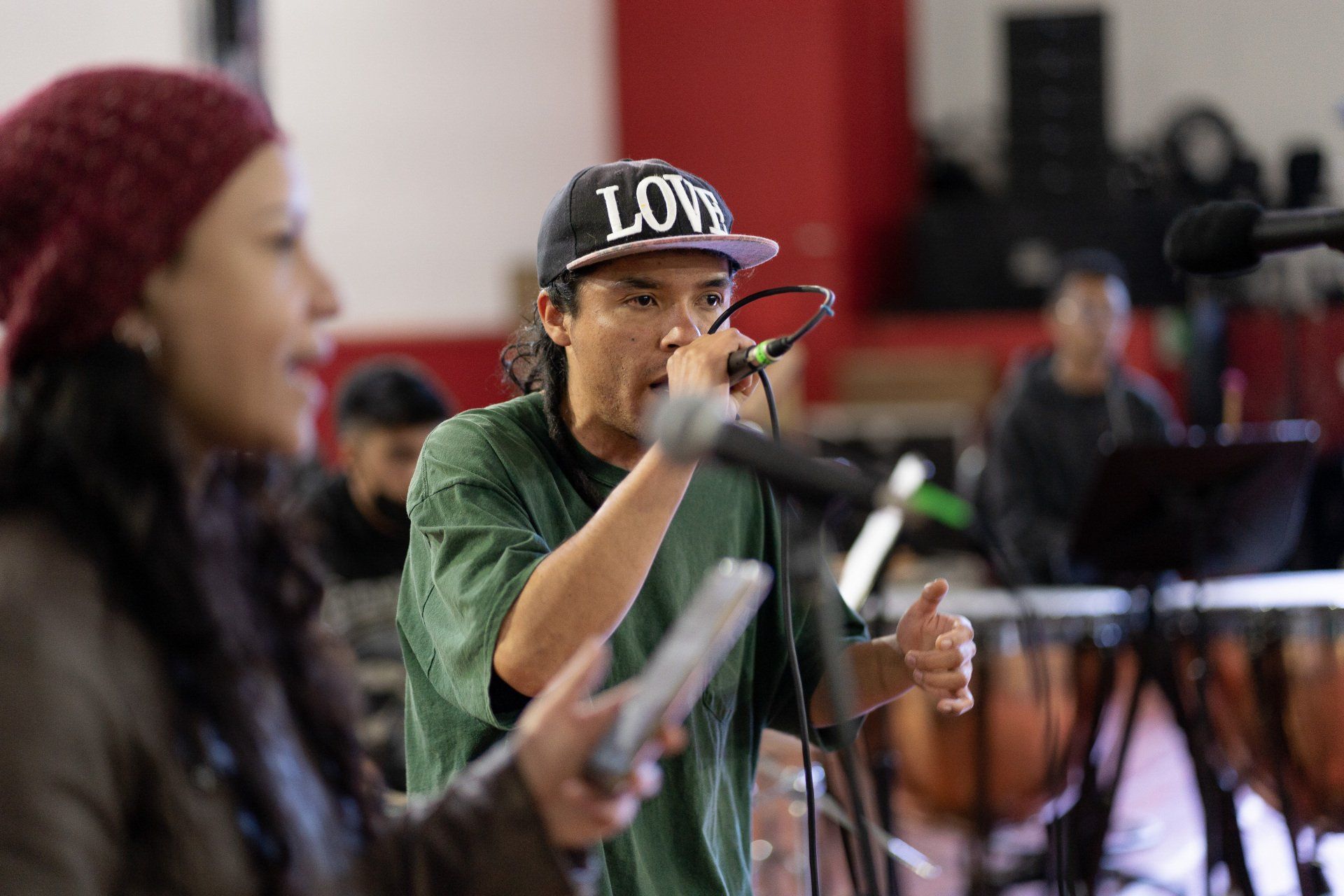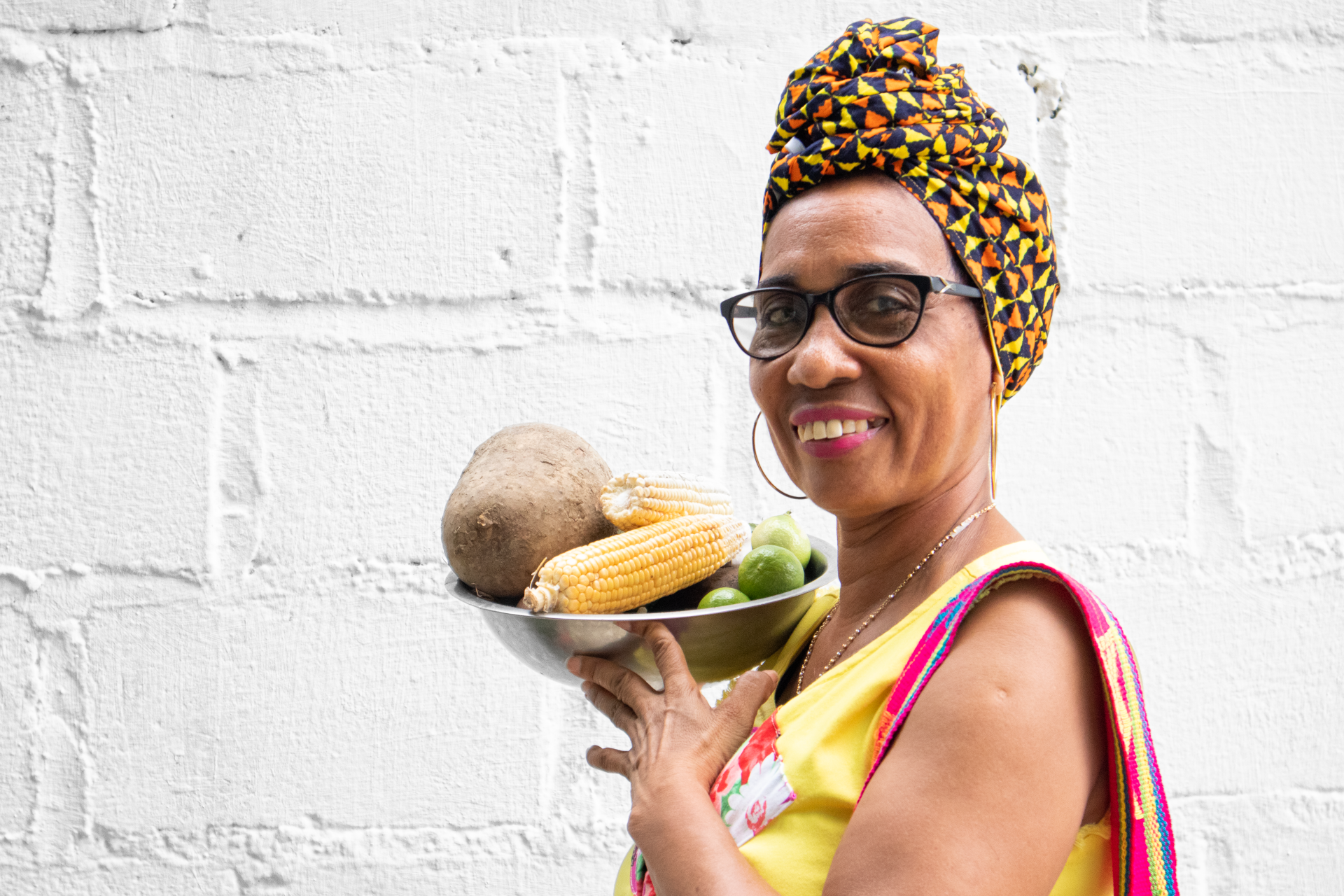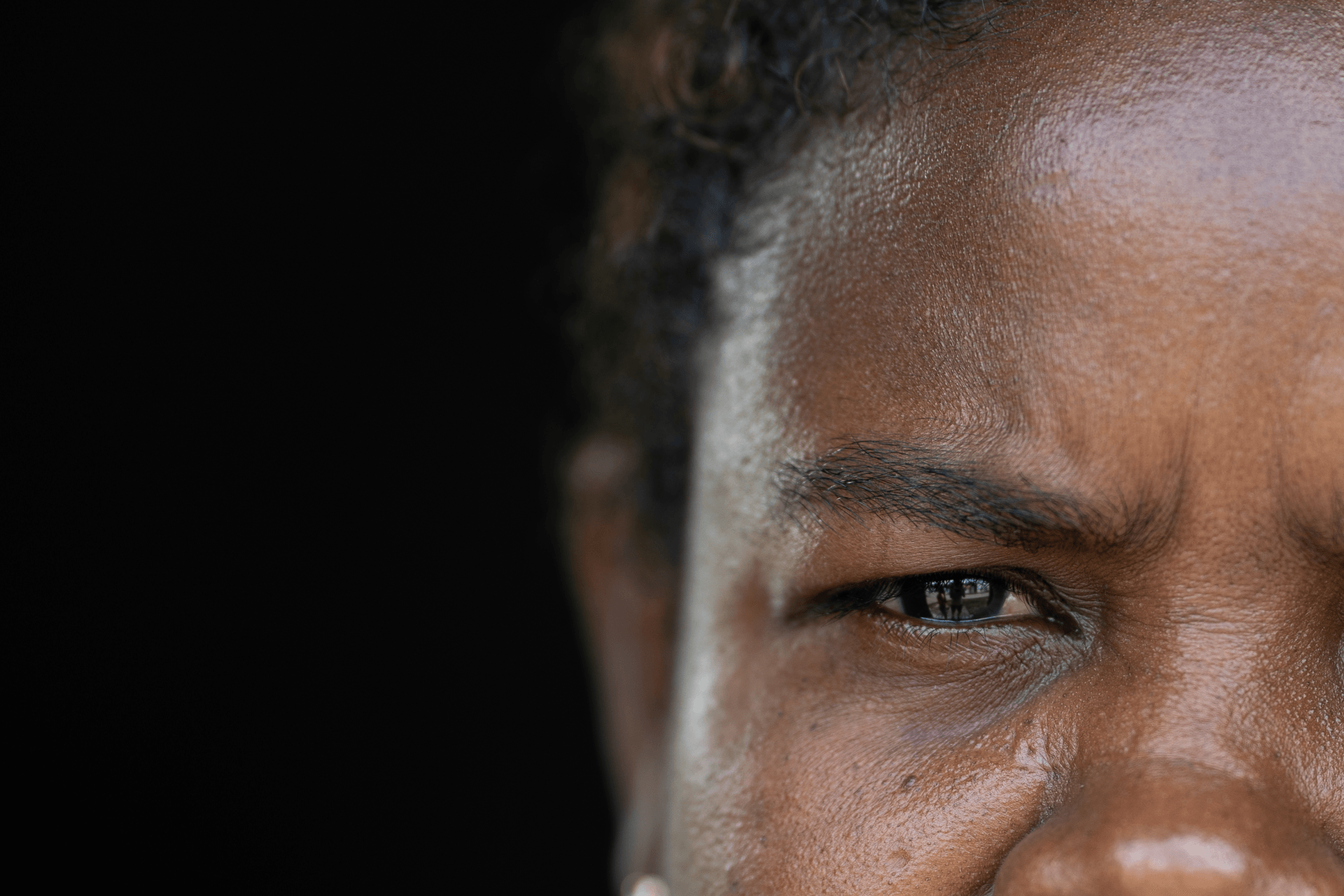A place where stories are told, a space where art is created, and a base where friendships are built. The Upeksha creative centre will be open to everybody in Bogotá, though it especially welcomes those who are not welcome in other places. In the Upeksha creative centre we will listen to the stories that are ignored elsewhere. We will break down the social, economic and political boundaries of storytelling and creative expression that exist in society today. People can come to write, record and publish music in our music studio. There will be a space to paint, to write, to dance, to perform. And for those who want to learn and to grow, the centre will have a classroom, where workshops will be given on song-writing, storytelling, music playing, painting, and anything else that’s in demand. The Upeksha creative centre will be created by those who will call it their second home. It will be a safe space of healing, where people can come to talk about their problems, where through workshops of yoga, harm reduction or cartography of the body and mind, visitors can work on their inner selves, healing the wounds created by the harsh circumstances that many Colombians have lived through and still live in today. The classroom will be the central part of the creative centre, but the teaching will also be done by those who come to tell their stories: teaching society about their communities, their cultures and their knowledge; teaching society how to heal and resolve deeply rooted structures of discrimination, stigmatization and hate, replacing those by compassion, mutual understanding and unconditional love; teaching society about Upeksha.
about this project
We request financial support for the creation of the Upeksha Creative Centre in Bogotá, Colombia, to provide a place for education, creative expression and visibility for those that are ignored and excluded elsewhere. We believe that those who suffer the most from the word’s issues should be at the forefront of solving them. Not because those problems are their fault, but because of their experience they have the knowledge necessary to know what needs to change. And because of their resilience they have strength necessary to implement those changes. The centre will therefore be a place where people can come to share their stories through storytelling, writing, art, music. They can also record songs and publish art so their stories will reach far beyond the doors of the centre. Finally, the centre will host a variety of workshops where participants can learn new skills, work on their personal development, and obtain the tools to create a better world for themselves, their communities and society as a whole.
The Upeksha Creative Centre
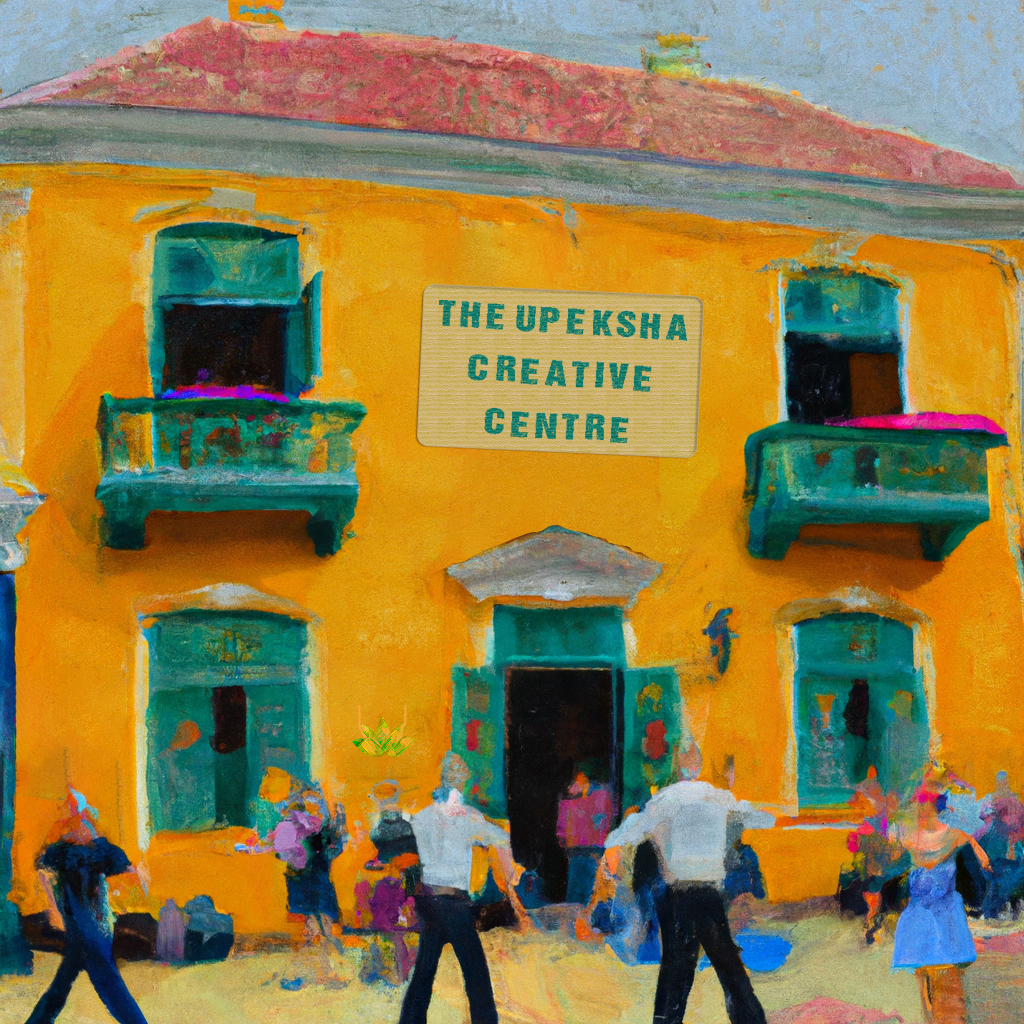
Upeksha – Voices of Resilience aims to provide an exhaustive solution to the problems faced by marginalized populations. This may sound over-ambitious, as we are talking about poverty, violence, discrimination, famine, displacement, unemployment, drug addiction, and so on. And we know that as a small NGO we simply don’t have the resources to solve all of these problems. Not a single organization, individual or even government, has those resources. Partly, because the problems we try to solve are social by nature (discrimination, stigmatization, inequality). These problems can only be solved when, as a society, we all work together. Therefore, we work from the believe that if we all unite, together, we can solve them. From this point of departure, we created a strategy to fight those problems at all levels. And at the very basis of this struggle are the people themselves. Those who despite all that they had to live through, still remain standing. Rather than victims, we prefer to call them people of resilience. And the Upeksha creative centre will be theirs

Our plan revolves around a three-phase process centred around the people of resilience. The first phase is internal: it’s based on the idea that we cannot heal society if we don’t first heal ourselves. Healing from massacres, displacement, drugs… just a few of the experiences that so many in this country have lived through, causing major traumas. Trauma can become a huge wall standing in the way of a bright future. We first need to tear down that wall in order to be able to see that future. Once that wall is down, we need to find out what our future will look like. We need to grow, to learn, to develop. This is phase two. Now it is time to look at wider society. What causes violence, injustice, hate, and all that comes from it? As Upeksha, we believe that the major condition that enables all these problems, is a lack of knowledge caused by a lack of visibility. Specifically, a lack of knowledge of other people, which creates room for stereotypes that justify oppression, keep people unemployed and leave them vulnerable to criminal groups. Stigmatizations create hate, discrimination and violence towards people that are already ground down. And outright lies that coverup atrocities, protect those responsible, only to be forgotten and repeated over and over again. A cycle of invisibility that reproduces violence, poverty and inequality, resulting in a downward spiral that breeds more and more discrimination, hate and conflict. We need to break that cycle to bring peace to the world. Now we arrived to step three of our process: to create, to tell, to share and most importantly to listen to each other. A song that shows the real face of a person that’s portrayed as a monster. A dance that retrieves the culture of a community buried under violence. Or a short story about displacement from those who have lived through it themselves, rather than outside commentators calling them invaders, fortune seekers or even terrorists. Because whether we are trying to build peace, create jobs, or fight climate change, the very first step is to bring people together, create mutual trust and compassion, to build the social foundation necessary to create a better world for all. All of this will be made possible in the Upeksha Creative Centre. All of this will be become possible with your help. A home to heal, to grow and to produce. A home for everybody.
What are the main goals of the Upeksha Creative Centre?
---------
What activities will be happening inside the Upeksha Creative Centre?
---------
How do we measure our success?
---------
What is the vision behind our three-phase plan?
---------
How do we approach participants?
---------
Who conducts the workshops?
---------
How will the produced music, videos and art be published and promoted?
---------
Where will the centre be located?
---------
How do we
finance the Upeksha Creative Centre?
Upeksha (उपेक्षा, “equanimity”)
“The fourth element of true love is upeksha, which means equanimity, nonattachment, nondiscrimination, evenmindedness, or letting go. Upa means “over,” and iksh means “to look.” You climb to mountain to be able to look over the whole situation, not bound by one side or the other. If your love has attachment, discrimination, prejudice, or clinging in it, it is not true love. (…) Upeksha has the mark called samatajñana, “the wisdom of equality,” the ability to see everyone as equal, not discriminating between ourselves and others. In a conflict, even though we are deeply concerned, we remain impartial, able to love and to understand both sides. We shed all discrimination and prejudice, and remove all boundaries between ourselves and others.”” (Nhat Hanh, 1998: 174).
Goals
Goals
These are the main goals of the Upeksha Creative Centre
01
Upeksha Creative Centre
-
To create a physical space that supports the production of art from communities and people that, due of their social economic situation, are not able to produce and distribute their creative expressions
We emphasize the importance of cultural diversity and equality, recognizing its essential role in the “sustainable development of communities, people and nations” (UNESCO, 2015: 3). The activities that will be conducted in the centre, will be designed based on the conviction that art is essential for social and psychological development of people and communities struck by poverty, violence and marginality. The final purpose of this project is to create social cohesion within communities and build bridges between communities locally, nationally and internationally.
02
Amplify Voices
-
To amplify the voices of the ignored, to hear the stories of the unheard, to make visible the culture of the invisible. Stigmatization, discrimination, hate and stereotypes are caused by a lack of visibility of those who suffer from these phenomena.
We aim to fight stigmatization, discrimination, hate and stereotypes, by showing the world who these people really are; their real stories, their feelings, abilities and creativities. Through this we also aim to shed light on injustices and atrocities. History will repeat itself if we don’t learn from it, if we ignore what has really happened. In order to eliminate human-caused suffering in the future, we have to remember our history, and learn from our mistakes as a society.
03
Education
-
The Upeksha centre will be a place of education, offer classes and workshops in different areas, to help them grow artistically, academically and personally
To provide education. As an NGO we have previously produced songs of artists that had never made a song before in their life. They’d never had any music lesson. While that is incredibly impressive by itself, it also leaves to think what they could achieve if they have just a few singing lessons, a couple of writing lesson, etc. Music lessons are expensive and therefore not available to a massive proportion of the Colombian population. The Upeksha centre will be a place of education and offer classes and workshops in different areas, to help participants grow artistically, academically and personally, providing them the tools to become self-sufficient and autonomous.
04
Internal Healing
-
Our goal is to help heal the mental wounds caused by war, to prevent further suffering and break down the psychological barriers standing in the way of a bright future for the entire country.
To provide emotional support for those who have suffered trauma in places struck by violence, abuse and poverty. Due to the massive violence in recent years and decades in Colombia, resulting in more than eight million internal displaced persons, there’s a great need of emotional support and psychological help to heal the mental wounds the war has left. Severe trauma can lead to suicide, aggression and a lack of faith in a positive and peaceful future. Resentment and anger will contribute to a cycle of violence. Our goal is to help heal some of those mental wounds, to prevent further suffering and break down the psychological barriers standing in the way of a bright future for the entire country.
Activities
Classroom
In the classroom participants will be taught the skills to teach society about their lives, communities and cultures. For those who want to share their stories through music, dance, painting or writing, we will offer workshops on lyricism, music theory, instrument playing, theatre, choreography, art, and creative writing. Do they want to reach out to an international audience? We will give English classes. Do they need help reflecting on their lives, their traumas, and their problems? We will introduce them tools such as yoga, meditation and Cartography of the Body and the Mind. Do they want to learn how to have their voices heard, their stories read, and their videos seen? We will offer workshops on marketing. We pose these activities deliberately as questions, because as said before, the kinds of workshops will depend on what’s in demand. While we, as founders of this NGO, have our own ideas on what needs to be done, we have no intention to impose our points of views on the communities we are trying to help. They live in these communities, in those circumstance, and they know best what they and their communities need. Therefore, we will encourage the input of participants on what will kinds of specific workshops will be conducted. We experienced from our earlier work, that this approach is widely appreciated. Hip Hop producers have expressed an interest in learning about music theory. Many participants are extremely motivated to learn English, and others have expressed a desire to learn more about photography and videography. Until now, we unfortunately don’t have the space to fulfil all these demands. The Upeksha Creative Centre and its classroom will allow us to do so.
Additionally, this area will also be a space where artists can exhibit their art and share their stories to the public. We will hold art exhibitions, storytelling nights, jam sessions, podcast recordings, concerts and live music recording sessions. The latter are sessions where different artists can perform their songs, lyrics, or freestyles while being recorded for videos we post on YouTube (inspired by BZRP Music Sessions (Argentina), 101 Barz (Netherlands) and Fire in the Booth (UK).
Additionally, this area will also be a space where artists can exhibit their art and share their stories to the public. We will hold art exhibitions, storytelling nights, jam sessions, concerts and music sessions. We also want to host live music sessions where different artists can perform their songs or lyrics while being recorded for videos we post on YouTube (inspired by BZRP Music Sessions (Argentina), 101 Barz (Netherlands) and Fire in the Booth (UK).
Music Studio
The music studio will (obviously) be for the recording of music. However, many of the artists we work with have never recorded music before. They often have no prior education on how to produce a song, how to make a beat, or how to play an instrument. However, despite this lack of skills we find it important that whatever song is recorded, matches the style and preferences of the artist. Therefore, if, for example we make a beat for a rapper, we find it important to create this beat together. Consequently, the music studio becomes a classroom where we teach the artists how to produce and record music. This way, they can become independent artists, and eventually produce their own music. While we try to help people, we find it very important that they don’t become dependent on us. Ideally, we want to help them in such a way that eventually they don’t need us or any other social help at all.
Additionally, to increase the visibility of the artists and the songs they produce in the studio, we encourage the creation of an accompanying music video. We also provide the equipment and technical knowledge to make that happen. And as with the music production, the production of videos provides the opportunity to teach skills of videography.
Silent Room
One day, Yan Carlos (one of the rappers we have been working with) came to my apartment to write the lyrics of a song. Afterwards, he asked if he could come more often, because the quiet space was helping him write; it enhanced his creativity. A lot of people in Bogotá live in incredibly small apartments right next to their neighbours or in informal settlements with of over one million inhabitants, where silence is practically absent. To be creative, to reflect and to process, one’s mind needs to be quiet. The silent room will be a space where people can find the silence that lacks on the street and in the slums. They can use it to write, to think or to talk with us or with each other about personal things. An Afghan refugee in Lesbos once told me, that although he was incredibly grateful for the food, refuge and clothes that many of the NGOs provided, what he really needed was simply someone to talk to, someone that listens
Reflecting, Learning and Growing
Research
As Upeksha – Voices of Resilience, we find it important to keep reflecting, learning and improving our work and add to the global knowledge on development, conflict resolution and positive social change. Specifically, we are interested in how storytelling, art and music can be beneficial in psychological healing in circumstances of war, poverty, (domestic) abuse, drug consumption, and homelessness, as well as its contribution to fighting stigmatization, discrimination and hate, connecting people across borders and creating more mutual compassion and understanding between people and communities across the world.
In order to research our impact regarding the above, we divided the above in several concrete expected achievements. For each achievement, we set different measurable indicators, for which we’ve developed methods to measure them. We divided our achievements in two main goals: to heal participants psychologically (based on the idea that we cannot heal the world if don’t first heal ourselves); and to heal society at the social level (replacing stigmatization, discrimination and hate for mutual compassion, understanding and unconditional love). We will measure both the quantitative impact and the qualitative impact of both these goals. For the full methodology see the project plan.
Core Research Questions
01
How do stigmatisation, discrimination and hate work and how can it be resolved?
02
How does trauma stand in the way of positive social change and how can we resolve it in order to build a better future for everybody?
03
What is the role of music, art, storytelling and other "alternative" processes in resolving social and personal trauma's?
Plan of Action
Plan of Action
The plan the realise the Upeksha Creative Centre can be divided in four stages:
01
Renting a Space
We will look for a space in Bogotá in the "localidades" of Chapinero, Santa Fe and Teusaquillo
02
Preparing the Centre
We will use the input of participants to co-create and furnish the space into the creative centre
03
Approaching Participants
To achieve the welcoming and warm home that we have in mind, we created a strategy to invite people and create a safe and welcoming environment
04
Conducting Activities
Who conducts the workshops and how do we publish and promote the music, artworks and stories of the participants?
Finding and renting the place
The Upeksha community centre will be located in Bogotá, Colombia. The specific location depends on what is available in Bogotá when we have raised enough funds to rent a space. Most importantly, the house has to be accessible for as many people as possible. In a huge city like Bogotá, with over 10 million inhabitants, it is hard to find a location that suits everybody. But we are aware that the north of Bogotá is mostly home to the wealthy, whereas social economic issues increase in the south and the centre of the city. However, we also want to make sure the area is safe enough to make it easy for volunteers to arrive to the centre. Taking these considerations into account, we limit our search for an appropriate space to the ‘localidades’ (districts) of Chapinero, Santa Fe and Teusaquillo. These are the most central areas in Bogotá that have relatively good accessibility from any part of Bogotá. These areas are considered generally safe as well. Finally, as described in the activities chapter, we will look for a space with at least 3 areas to create the classroom, music studio and silent area.
Arranging and furnishing the centre
Once we rented a space, we will furnish the different spaces accordingly with the necessary equipment and furniture. As said before, we highly value the input of those who we aim to reach, the people of resilience. The centre will be theirs, so we will invite everybody that wants to, to participate in creating and furnishing the centre.
Approaching Participants
Just like any other new place, whether it is a bar, restaurant or community centre, we will have to convince people to come to the Upeksha Creative Centre. Initially, we will address our existing network of artists, organizations and movements, extending invitations to them and their peers to attend our first workshops or recording sessions. Moreover, we will invite them to help us create the centre. As they come from the communities in which we try to intervene, we highly value their input on the kind of workshops we will organize and how to bring people to the centre.
Another way to introduce people to the centre will be through events. We will organize a free concert or an exhibition with artists that we have been working with before. This will allow people to visit the centre, get to know us, and learn about our intentions and the activities they can participate in. Additionally, we will extend invitations through flyers handed out on the streets, as well as online invitations through social media platforms like Instagram, Facebook and our website.
Regarding recording sessions, workshops and other activities we will make a schedule and people will be able to register for each activity. Workshops will have a maximum number of participants to make sure the activity can be conducted in a productive and peaceful manner. As for the music studio we will set up meetings of 2 or 3 hours per session, making sure artists don’t walk in each other’s way, while still encouraging working in groups, putting an emphasis on co-creation and exploiting the power of music to bring people together.
Ground rules of the Upeksha Community Centre
Upeksha roughly means “indiscriminate love”. We chose this name because we believe that every single person in the world deserves to be heard, loved and live a dignified life, no matter where they are from, what they look like, who or what they like and what they do. That is why everybody is welcome in the Upeksha Creative Centre. However, for this reason our first and most important rule is that everybody that walks through its doors, treats anybody else with respect and compassion. We will not accept any form of violence, bullying, discrimination, racism, classism, sexism, homophobia, transphobia, or any other form of negative judgement towards others. We don’t all have to be same, to like the same or think the same, but we are here to listen to each other, to understand each other, and to respect each other, promoting mutual compassion to help each other move forward in life.
Secondly, naturally we will not allow anyone to break any laws on the premises. This includes drug consumption, weapon possession, stealing, etc. If someone does break the law, we will take the necessary measures.
Finally, as long as we are living through the Covid19 pandemic, we will take the necessary measures to keep the virus from spreading inside the house. We keep distance between one another, we will ask everybody to wash their hands on a regular basis, and we will make sure that any shared equipment (instruments, cameras, microphones) will be disinfected in between every change of user.
Who Conducts the Activities?
Once the centre is finished, we will start organising our activities. Up until now the work of Upeksha has been conducted primarily by its two founders: Catalina Barragán and Casper te Riele. We will continue to do so. Casper, with his background in sociology, music and videography, will be giving workshops on storytelling, filmmaking, guitar playing and music production. Catalina, with a background in education and psychology, will be giving workshops on subjects such as yoga, meditation, plastic arts, and cartography of the body and the mind.
However, we realize, the more souls work with Upeksha, the bigger our impact will be. The Upeksha creative centre will allow us to bring more people into our family. Volunteers that can give workshops, offer psychological support, and those wo can help write, produce, and record art. We will reach out to universities, to different faculties, letting teachers and students know about the possibilities of volunteering or doing an internship at the Upeksha centre. We will reach out to music production programs to recruit musicians to help write, record, mix, and produce songs. We will knock on the door of filmmaking academies for videographers that can help record videos as well as give workshops on filmmaking. We show our face at art schools, psychology majors, etc. And finally we will go around hostels asking international tourists and expats to come and connect and possibly teach English or other languages. We are open to any volunteer that can use their skills to contribute to the Upeksha centre. This way, we will be able to offer a diversity of workshops, and we will also be able to produce art at a higher rate, therefore helping more people, more efficiently.
However, as Susana Fergusson once told us, “When I help someone, I help myself, and when I teach someone, I learn myself”. The people of resilience have a lot to teach us. They have experiences that thought them lessons valuable to the entire world. Therefore, at the centre, everybody can be a student as well as a teacher. There’s no hierarchy. We are all equal. And so, university students can come to learn from those who learned their lessons on the streets. Because as said before, Upeksha’s creative centre is for everybody. It will be a place where society’s divisions between rich and poor, north and south, black and white, are shattered. Here everybody can meet, everybody can learn from each other, and everybody can become friends.
What will be done with the music, videos and art?
Several of our goals focus on increasing the visibility of artists as well as the marginalised communities they live in. Therefore, we devote a lot of attention on how to publish, distribute and promote music, videos, art pieces and writings. Our goal is to maximise the visibility of the publications, the creators of those publications and their communities.
As for now, we publish everything mainly on our website, our YouTube channel and on streaming platforms like Spotify. The YouTube channel is where all the videos and music videos are published. We advertise our videos using Google ads to increase their visibility. In the description of each video we will refer to the website where people can read background information on the projects, including stories on the creators and their communities. Therefore, the website includes background articles written by volunteers as well as the writings written by our participants. In many cases we will also publish a “behind the scenes video” showing how the project was conducted and letting the artist explain the meaning behind the song, art piece or other form of creative expression.
Songs are also published on streaming platforms such as Spotify, Apple Music and Amazon Music. We use ONErpm as our distributor. Our podcast, Everyday Heroes, is published on Spotify and Apple Podcasts as well.
When it comes to promoting the material and driving as much traffic as possible to the channel and the website, we use social media for online marketing: Instagram, Facebook, Twitter, and Tik Tok. With enough views and streams, Spotify and YouTube will share add revenue with us. Generated revenue will be shared fairly with the artists and any profit that Upeksha makes will be used to support the production of new material and the support of new artists and storytellers.
Finally, we will search for ways to exhibit the art works in real life situations. We will organise concerts in the Upeksha centre for the musicians to perform their music, and exhibitions for artist to exhibit their artworks. These events will also be an opportunity for the artist to generate a little bit of financial support for their art. And to increase their social network and fame within their own communities.
Sustaining the centre
We are requesting funds to finance the centre for two years. However, we plan to keep the centre alive long afterwards and we even dream about opening a centre in different places around the world. Therefore, we included some strategies for the centre to become self-sustainable within two years. First of all, the centre will allow us to increase the publications of songs, videos and art pieces significantly, which will subsequently increase the visibility of Upeksha itself: more subscribers, followers, viewers, and contributors. More subscribers and views on YouTube will allow us to monetize our videos. This means that YouTube will share add revenue with us. The same applies to our published songs and podcasts. We will obviously share these revenues fairly with the artists that created those songs and videos. However, part of it we will reinvest in the Upeksha Creative Centre. Additionally, more visibility will result in more donations, which we will also use the sustain the centre over time. Finally, we will include small businesses into the Upeksha centre, such as selling coffee, food and drinks during events, or selling Upeksha merchandize to those who come to concerts, exhibitions and workshops. All together, we are confident that within two years we will produce enough revenue to keep the centre alive without any outside support.
Finances
Budget Upeksha Creative Centre
We will have monthly costs, as well as one-time expenses on furniture, studio equipment and utensils. The budget exclusively includes expenses that are yet to be spend. It doesn’t include equipment (cameras, microphones, etc.) and human resources (volunteers) that will be donated to the centre.
See the full budget here
01
Variable costs
We expect to rent a space for about € 880,- a month. € 500,- will be reserved as a contribtion for the two people wo will be in charge of the centre. Other variable costs include art material, food, utilities and promotion and distribution of songs and videos. Brining us to a total of:
€ 2.450 , - per month
02
Fixed Costs
This will include furniture (chairs, tables, desks) and equipment (speakers, microphones, camera) estimated at a total of:
€ 2.350 , -
1 year total
€ 31.750, -
2 year total
€ 61.150, -
Coverage Plan
We decided we will launch the project by renting a space once we have enough financial resources to finance the house for at least 2 years. This will mean we will have to raise €61.150, - before we can carry on with the project. We are confident that the creative centre will help Upeksha grow to such an extent that within the first two years more funds can be raised to ensure to continuation of the Upeksha Creative Centre in the years thereafter.
The funds to establish the centre will be collected in three different ways: through subsidy applications, crowdfunding, and Upeksha’s own reserves including studio equipment that is already owned by the foundation and its general director. Finally, the success of the creative centre will depend as much on financial resources as on human resources, meaning people that will ensure to execution of projects, workshops, administration and other work that will be necessary to turn the centre into the space we envision.
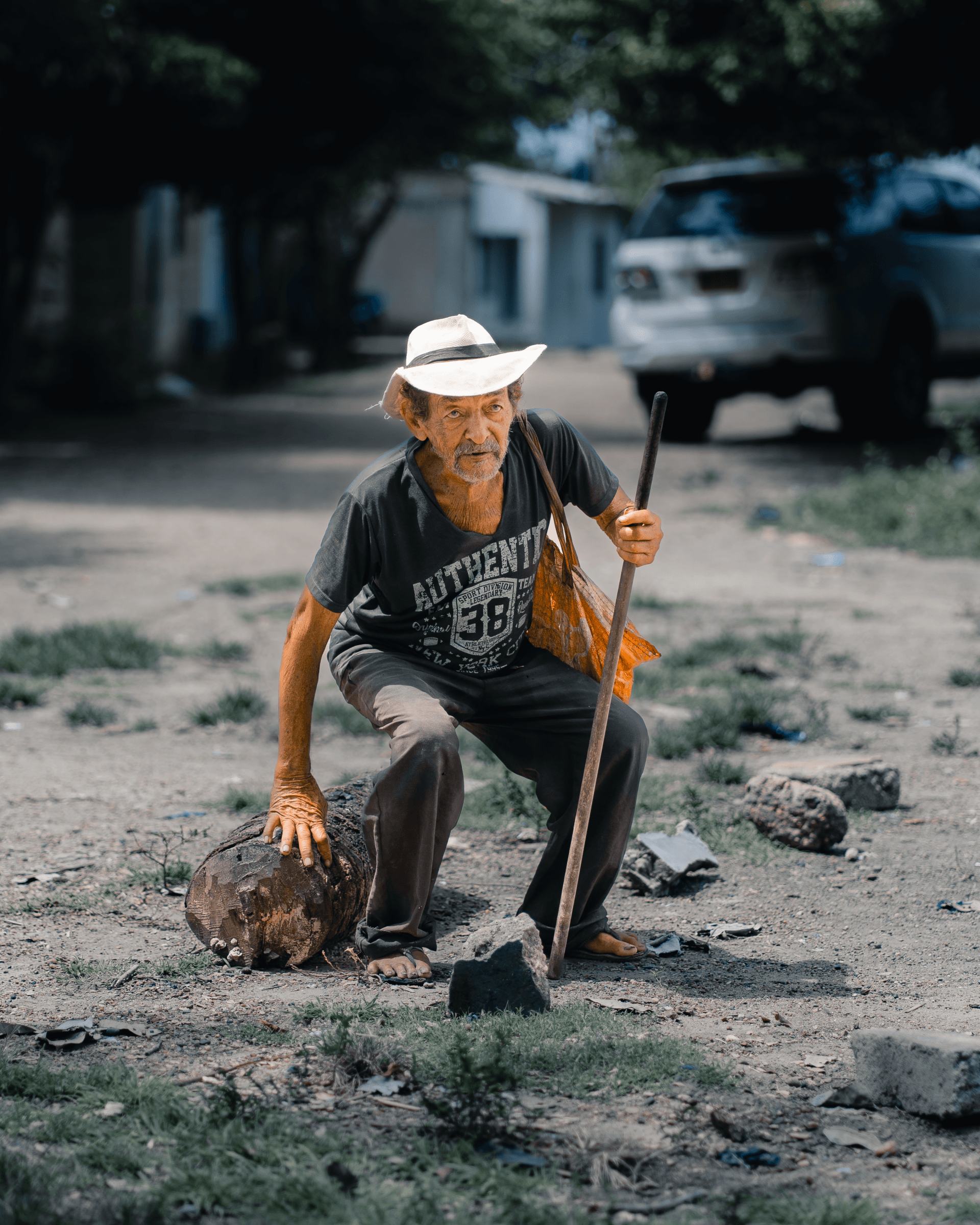
01
Subsidies
We will apply for subsidies to support the creation of the Upeksha Creative Centre for at least two years. After those two years, we aim to be self-sustainable through revenue from YouTube, Spotify, live events, merchandise, and more.
02
Crowdfund
We know that many people in the western world are aware of the privileges we have in our countries regarding access to education, healthcare, political participation. We also know that many of these people want to help those who weren’t born in such favourable circumstances. However, it is incredibly hard to decide how to help, because we never know who we are really helping. One of the objectives of Upeksha is to bring these two vastly different worlds together. We ask people to contribute to the creation of this centre, so they will be able to get to know the people they are helping. We will make sure to share everything that will be done in the centre. And we keep our doors wide open for everyone that would like to visit. The centre is for everybody: locals, nationals, and international visitors. We will launch a crowdfund specifically meant to raise funds for this project.
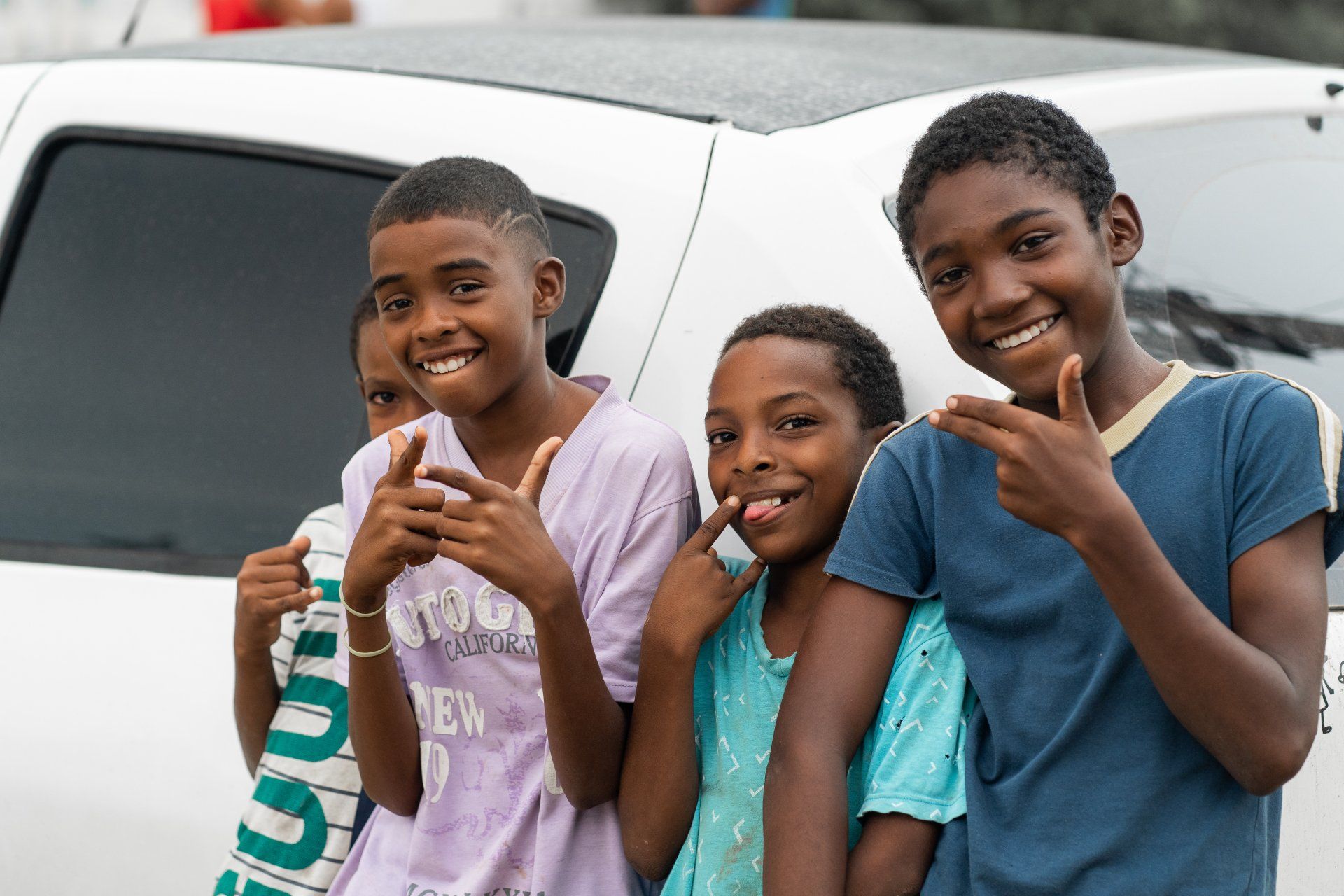
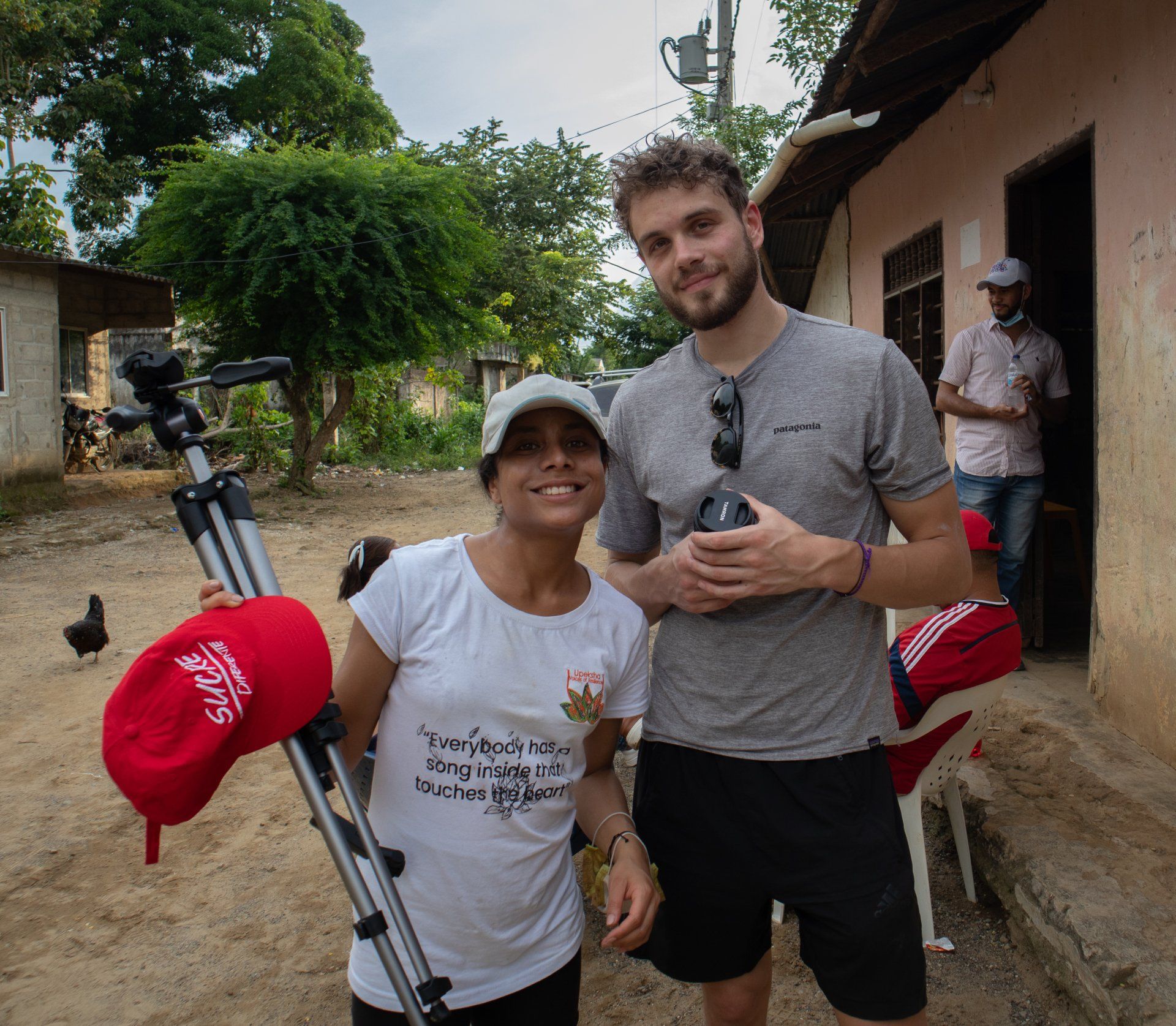
03
Natura
The centre will heavily depend on volunteers who come to the centre to give workshops, help with recording, producing and filming, and other activities. However, the requested subsidy includes a small contribution for two people that will be in charge of the creation, management and sustainability of the creative centre. The contribution will allow Casper te Riele and Catalina Barragán Hinestroza to take on full responsibility to ensure the success of the Upeksha Creative Centre. Their daily responsibilities will include:
- To give workshops;
- To record, produce, and distribute music and art;
- To take care of administrative duties;
- To welcome participants to the workshops and art productions;
- To invite volunteers to give additional workshops, help with the production of art, and organisation of events;
- To organise concerts, exhibitions and events;
- To ensure the safety and rights of everybody entering the space;
- To keep the centre alive after two years
"We, Casper and Catalina, are fully devoted to give all their time, effort and energy to turn this dream of ours into a reality. We hope you will join us on this journey and together make the world we share a little bit better."
Warmest regards,
Casper te Riele & Catalina Barragán Hinestroza,
Bogotá, December 1, 2022
Contact Info
Amsterdam,
the Netherlands
Whatsapp: +573202085817
Email: info@upeksha-vor.org
Data
IBAN: NL36 INGB 0007930674
ATTN: Stichting Upeksha - Voices of Resilience
BIC: INGBNL2A
CCI: 80727247
RSIN: 861776458




